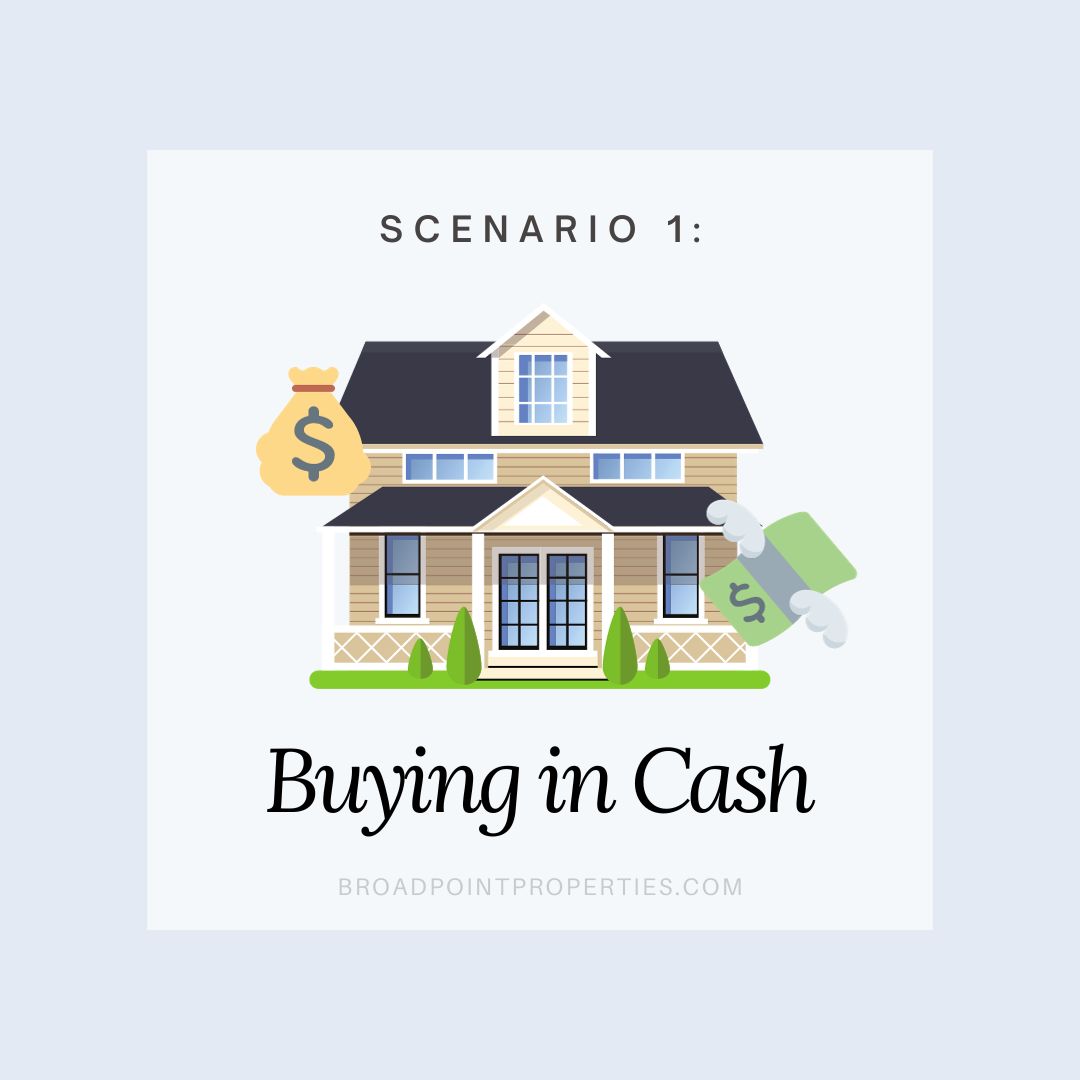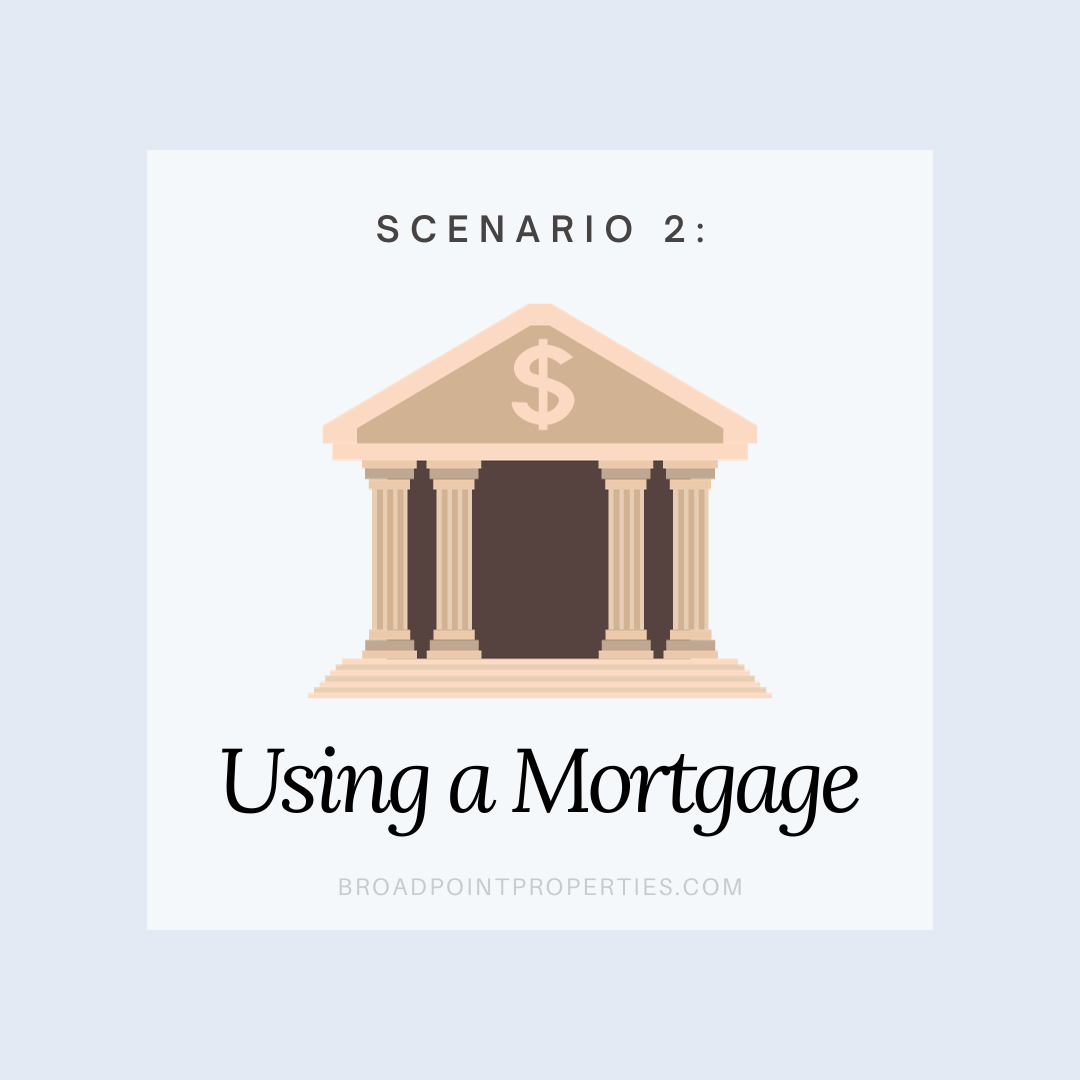
When it comes to buying rental properties, you can choose between making a cash purchase or securing a mortgage loan. Each method has its unique benefits and drawbacks. Here’s a comparison of purchasing rental properties outright with cash versus opting for a mortgage:
Let’s compare the potential return on investment (ROI) for buying a rental property in cash versus using a mortgage in San Diego.
Note: This is a simplified example, and real-world scenarios can vary based on many factors, including property price, rental income, expenses, and market conditions.
Scenario 1: Buying in Cash

Property Price: $500,000
Cash Purchase Price: $500,000
Rental Income (Monthly): $2,500
Annual Rental Income: $2,500 x 12 = $30,000
Annual Expenses (including property tax, insurance, maintenance, and property management): $8,000
Net Annual Income (Before Taxes): $30,000 – $8,000 = $22,000
Pros:
- No Interest Payments: Buying with cash eliminates the need for monthly mortgage interest payments, saving you money in the long run.
- Quick Purchase: Cash transactions can close faster because they don’t require the time-consuming mortgage approval process.
- Increased Cash Flow: Without mortgage payments, your rental property’s monthly cash flow may be higher, potentially resulting in more immediate income.
- No Debt: Purchasing with cash means you have no mortgage debt, reducing financial risk.
Cons:
- Lack of Liquidity: Tying up a significant amount of cash in a property can limit your liquidity for other investments or emergencies.
- Missed Tax Deductions: You won’t benefit from mortgage interest deductions on your income tax returns.
- Lower Leverage: Buying with cash limits your ability to leverage your investment, potentially reducing the overall return on investment (ROI).
Scenario 2: Using a Mortgage

Property Price: $500,000
Down Payment (20%): $100,000
Mortgage Amount: $400,000
Mortgage Interest Rate: 4.0%
Loan Term: 30 years
Monthly Mortgage Payment (Principal and Interest): Approximately $1,910
Rental Income (Monthly): $2,500
Annual Rental Income: $2,500 x 12 = $30,000
Annual Expenses (including property tax, insurance, maintenance, and property management): $8,000
Net Annual Income (Before Taxes): $30,000 – $8,000 = $22,000
Annual Mortgage Payments: $1,910 x 12 = $22,920
Pros:
- Leverage: Using a mortgage allows you to leverage your investment. With a smaller upfront investment, you can control a more valuable asset.
- Diversification: You can spread your investment capital across multiple properties or asset classes, enhancing diversification.
- Tax Benefits: Mortgage interest payments are typically tax-deductible, reducing your taxable income.
- Preserve Liquidity: You can preserve cash for other investments or emergencies by not tying up all your capital in a single property.
Cons:
- Interest Costs: Mortgage loans involve interest payments over the life of the loan, increasing the overall cost of the property.
- Debt Obligation: Taking on a mortgage means committing to monthly payments, regardless of rental income fluctuations.
- Qualification: Securing a mortgage for an investment property may require a higher down payment and stricter qualification criteria compared to primary residences.
- Interest Rate Risks: Fluctuations in interest rates can impact your mortgage costs and overall ROI.
ROI Comparison:
? Cash Buyer:
Annual Net Income: $22,000
ROI (Annual Net Income / Cash Purchase Price): $22,000 / $500,000 = 4.4%
? Mortgage Buyer:
Annual Net Income: $22,000 (after subtracting mortgage payments)
ROI (Annual Net Income / Down Payment): $22,000 / $100,000 = 22%
Analysis:
- The cash buyer has a lower ROI percentage (4.4%) because they invested the full property price in cash. However, they have the advantage of no mortgage payments and a more straightforward financial situation.
- The mortgage buyer has a higher ROI percentage (22%) because they leveraged their investment by putting down a 20% down payment and financing the rest. However, they have mortgage payments to consider.
- The mortgage buyer benefits from leverage, potentially allowing them to invest in multiple properties with the same initial capital.
- The cash buyer avoids mortgage interest payments and has a more straightforward financial setup but may tie up a significant amount of capital in a single property.
- Cash investors have the ability to seize favorable opportunities promptly instead of having to delay due to the mortgage application process.
To be successful in real estate investing, it requires a full understanding of what it is you’re getting into. The choice between buying rental properties with cash or using a mortgage depends on your financial situation, investment goals, and risk tolerance. Some investors prefer the security of owning properties outright with no debt, while others leverage mortgages to acquire multiple properties and potentially increase their returns. Additionally, real estate market conditions in San Diego can change over time and may influence the potential ROI.
It’s crucial to conduct thorough financial analysis and consider your long-term investment strategy when making this decision. Consulting with a financial advisor or real estate professional can provide valuable insights tailored to your specific circumstances.
More tips on property investing can be found here.




